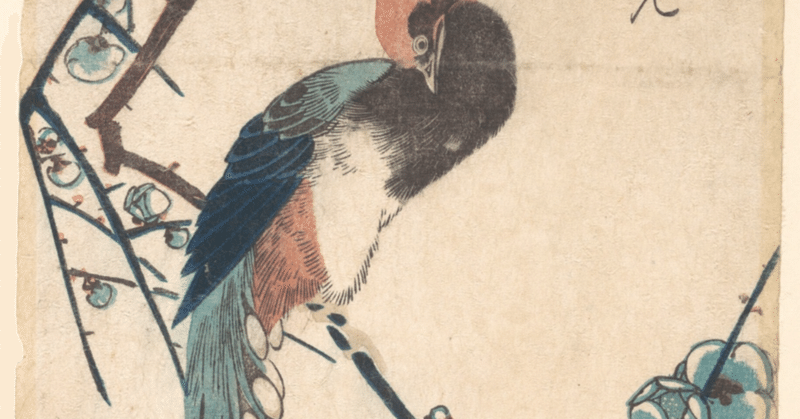
Re: In a Station of the Metro 和訳あり

Declaration that this is a work ex rebus Dolorum
この作品は再悲詩(Ex Rebus Dolorum)であることを宣言する
all sorrow is triumph and all triumph is sorrow
すべての悲しみは勝利であり、すべての勝利は悲しみである
omnis dolor est triumphus et omnis triumphus est dolor.
I of the sorrows
哀しみの我から
Ego Dolorum
「再悲詩」のマニフェストーーー新しい詩の試み Manifesto of Dolorum---a new experiment of poetry |JTR777 (note.com)
original haiku-like poem by Ezra Pound
In a Station of the Metro | RPO (utoronto.ca)
(タイトル訳:メトロのある駅で)
「メトロ」はフランス語で地下鉄の呼び方です。
Original Text
The apparition of these faces in the crowd :
Petals on a wet, black bough.
AI translated:
群衆の中に憑くこれらの顔:
濡れた黒い枝の上の花びら。
Reply: (JTR777)
colour, the scent-chasing, his
色はかおり追い、その
wind-watch "Chi-ri-nu-ra-zu"
風見ーー「散りぬらず」ーー*1
green sows, blue flours.
白粉(お・しろい)紅粉(お・くろい)
the hand removes himself--- the ink fresh.
手付かずーーー墨染(ボク・染め)に作(さく)
舞い上がれ
"mē apiscere! "
*1
(Your hand only scatters, and did not shatter, or rip,
or finish it.
this piece of purloined toilette.*a)
君の手はまくが、たたかない、わらない、おわらない。
盗んだトワレット*aのかけらを)
*a
toilet / toilette トワレット
etymology 字源:
toile --->(diminutive) toilette
(toile の指小辞)
(toile =“cloth” / "布”)
(廃語, 化粧台にかける) 覆おおいの布ぬの。[17–19世紀]
(現在では, 歴史 or 古・廃) 身み繕づくろい。[17世紀より]
(比喩的に) 汚きたない場所。[20世紀より]
(obsolete) A covering of linen, silk, or tapestry, spread over a dressing table in a chamber or dressing room. [17th–19th c.]
(obsolete) The table covered by such a cloth; a dressing table. [17th–19th c.] quotations ▼
(now historical or archaic) Personal grooming; the process of washing, dressing and arranging the hair. [from 17th c.] quotations ▼
toilet
Notes 注釈 (凄く疲れたなのでAI)
1]the metro: the Paris subway system.
See Pound's commentary on this poem in his article "Vorticism," The Fortnightly Review 571 (Sept. 1, 1914): 465-67 (AP 4 F7 Robarts Library):
"Three years ago in Paris I got out of a "metro" train at La Concorde, and saw suddenly a beautiful face, and then another and another, and then a beautiful child's face, and then another beautiful woman, and I tried all that day to find words for what this had meant to me, and I could not find any words that seemed to me worthy, or as lovely as that sudden emotion. And that evening, as I went home along the Rue Raynouard, I was still trying, and I found, suddenly, the expression. I do not mean that I found words, but there came an equation ... not in speech, but in little spotches of colour. It was just that -- a "pattern," or hardly a pattern, if by "pattern" you mean something with a "repeat" in it. But it was a word, the beginning, for me, of a language in colour. I do not mean that I was unfamiliar with the kindergarten stories about colours being like tones in music. I think that sort of thing is nonsense. If you try to make notes permanently correspond with particular colours, it is like tying narrow meanings to symbols.
"That evening, in the Rue Raynouard, I realised quite vividly that if I were a painter, or if I had, often, that kind of emotion, or even if I had the energy to get paints and brushes and keep at it, I might found a new school of painting, of "non-representative" painting, a painting that would speak only by arrangements in colour.
注
1]メトロ:パリの地下鉄。この詩に関するパウンドの解説は、彼の論文「Vorticism」The Fortnightly Review 571(1914年9月1日)を参照: 3年前パリで、私はラ・コンコルドで "地下鉄 "を降り、突然美しい顔を見た。そしてその日の夕方、レイヌアール通りを家に帰ろうとしたとき、私はまだ試行錯誤を続けていた。言葉を見つけたという意味ではなく、方程式を見つけたのだ......言葉ではなく、小さな色の斑点を。それはまさに「パターン」であり、「パターン」というのが「繰り返し」のあるものを意味するのであれば、パターンとは言い難い。しかし、それは私にとって色彩言語の始まりであり、言葉であった。色とは音楽の音色のようなものだ、という幼稚園の話を知らなかったわけではない。
そんなことはナンセンスだと思う。その夜、私はレイヌアール通りで、もし私が画家だったら、あるいはもし私がしばしばそのような感情を持っていたら、あるいはもし私が絵の具と筆を手に入れ、それを続けるエネルギーを持っていたら、新しい絵画の流派、「非具象的」絵画、つまり色彩のアレンジメントだけで語る絵画を見つけることができるかもしれないと、はっきりと悟った。
....
"That is to say, my experience in Paris should have gone into paint ...
"The 'one image poem' is a form of super-position, that is to say it is one idea set on top of another. I found it useful in getting out of the impasse in which I had been left by my metro emotion. I wrote a thirty-line poem, and destroyed it because it was what we call work 'of second intensity.' Six months later I made a poem half that length; a year later I made the following hokku-like sentence: --
'The apparition of these faces in the crowd:
Petals, on a wet, black bough.'
"I dare say it is meaningless unless one has drifted into a certain vein of thought. In a poem of this sort one is trying to record the precise instant when a thing outward and objective transforms itself, or darts into a thing inward and subjective.
"This particular sort of consciousness has not been identified with impressionist art. I think it is worthy of attention."
See also a republication of this essay in Pound's Gaudier-Brzeska: A Memoir (1916; London: New Directions, 1960): 86-89).
The lines have no spaced words in 1916.
つまり、私のパリでの経験は、絵の具の中に入るべきだったのだ......」「『ひとつのイメージの詩』は、重ね合わせの一種である。私はこの詩が、メトロの感情に取り残された袋小路から抜け出すのに役立つことを知った。私は30行の詩を書いたが、それはいわゆる「第二の強度」の作品だったので破棄した。半年後、私はその半分の長さの詩を作った。一年後、私は次のようなホクのある文章を作った: --群衆のなかのこれらの顔の幻影 濡れた黒い枝の上の花びら』」あえて言うなら、ある思想の脈絡に流れ込まなければ意味がない。この種の詩では、外向きの客観的なものがそれ自身を変容させる、あるいは内向きの主観的なものに飛び込む、その正確な瞬間を記録しようとしている。このエッセイは、パウンドの『Gaudier-Brzeska: このエッセイは、パウンドの『ゴーディエ=ブルゼスカ回想録』(1916年、ロンドン:ニューディレクションズ、1960年)にも再掲されている: 86-89).1916年当時、この行には空白文字はなかった。
(Ezra Pound, "Contemporania," Poetry: A Magazine of Verse, 2.1 (April 1913): 6. Ezra Pound, Lustra (London: Elkin Mathews, 1916) 45 PS 3531 O82L8 1916 Robarts Library. See also Ezra Pound's Poetry and Prose: Contributions to Periodicals, prefaced and arranged by Lea Baechler, A. Walton Litz, and James Longenbach (New York and London: Garland, 1991), I (1902-1914): 137. PS 3531 O82A6 1991 Robarts Library.)
(エズラ・パウンド、"Contemporania"、Poetry: A Magazine of Verse, 2.1 (April 1913): 6. Ezra Pound, Lustra (London: Elkin Mathews, 1916) 45 PS 3531 O82L8 1916 Robarts Library. エズラ・パウンドの詩と散文も参照: また、Ezra Pound's Poetry and Prose: Contributions to Periodicals, prefaced and arranged by Lea Baechler, A. Walton Litz, and James Longenbach (New York and London: Garland, 1991), I (1902-1914) も参照のこと: 137. PS 3531 O82A6 1991 Robarts Library.)
この記事が気に入ったらサポートをしてみませんか?
